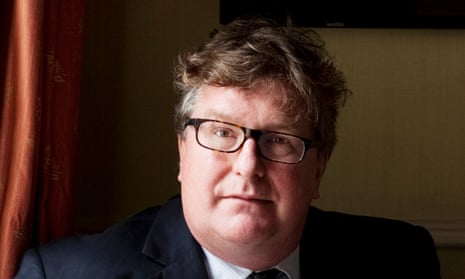Hedge fund millionaires backing Boris Johnson will make a killing from a no-deal Brexit, according to the former chancellor Philip Hammond. The claim is these “short sellers” are betting on big falls in share prices and the value of sterling in what critics say is a classic example of “disaster capitalism”. But how do they do it, who are they and are they all merchants of doom?
Tell me how shorting works
The conventional way to make money from shares is to buy at a low price then sell at a high price. It is called going long. Shorting is the opposite: buying high and selling low.
The approach of hedge funds is to target a share they believe is heading for a fall. But the only way to make a profit is by not really owning those shares in the first place, rather “borrowing” them. Typically, the hedge fund borrows them, at a small fee, from a pension fund that is holding them for the long term.
The investor (speculator is probably a better word) borrows, say, 10,000 BP shares and promises to return them at a fixed time – let’s say in a month. The speculator instantly sells the BP shares at the going market price – say 500p, giving them £50,000.
In a month’s time, when they have to return the shares to the pension fund, the shares have fallen to, say, 400p. So the speculator goes into the market, buys 10,000 shares for £40,000 and hands them back, making a profit of £10,000 along the way. But if the shares have risen to 600p, they will make a loss of £10,000.
The reality is rather more sophisticated than this – speculators rarely take actual delivery of shares, and use other methods such as CFDs (contracts for difference) and short ETFs (exchange traded funds) – but the principle is the same.
Sounds super. Should I try it?
Probably not. The most you can lose when investing conventionally is the value of the share. In shorting, it’s possible to lose more. If the share you are shorting soars in price then you have to go back into the market and pay for it – possibly much more than your original investment. It’s one reason the Financial Conduct Authority is not especially keen on shorting among small investors.
But it’s surprising how accessible shorting has become for retail investors. ETFs in particular are cheap to buy and easy to trade, such as those that promise to move higher every time the FTSE 100 index falls. For example, Legal & General has a FTSE 100 Super Short Strategy fund that gives you a 2% gain for every 1% fall in the FTSE 100, and is available for sale on Hargreaves Lansdown’s platform.
So who is really doing it?
The reality is that the big money from shorting is made by a relatively small club of extremely wealthy individuals. Every day, the FCA publishes a list of which shares are being shorted and who is doing the shorting. Shorttracker.co.uk also maintains a useful update. The same names crop up again and again – Marshall Wace, Odey Asset Management, GLG, AQR and BlackRock.
Marshall Wace manages about $39bn (£32bn) from its Mayfair HQ, and was founded by Paul Marshall and Ian Wace. In January, they penned an article for the Times (paywall) titled: “Let’s hurry up with Brexit: there will be benefits for all.”
Crispin Odey of Odey Asset Management has donated almost £900,000 to pro-Brexit campaigns, and also placed huge bets against the pound and government bonds in the run-up to the EU referendum. It is estimated he made a £220m profit when sterling collapsed after the leave victory.
Are they counting on a hard Brexit?
Yes and no. Clearly some of the positions taken by Odey and Marshall Wace will pay off if there is a crash-out Brexit and UK-facing stocks are hit hard. Fund managers say the sectors most vulnerable to a no-deal Brexit are companies that make most of their profits in the UK rather than abroad – such as housebuilders and retailers – and Odey is in a lot of them.
Odey has big short positions against Intu Properties, which runs 17 shopping centres across the UK, the retailer Debenhams, and the housebuilders Berkeley Group and Cairn Homes.
But he also has a big position against Lancashire Holdings, a London- and Bermuda-based insurer involved in aviation, energy and marine insurance. Another of his big shorts is in IG Group – the world’s biggest providers of CFDs, the very instrument most used to carry out shorting.
Marshall Wace has a broader spread of shorts, covering 41 companies in the UK and overseas. Broadly speaking, these are UK-facing with a likelihood of being damaged by Brexit, but Marshall Wace’s shorts include Mexican gold producers and South African diamond mines.
Are all the hedge fund shorters Brexiters?
Not necessarily. Big institutions and pension funds also participate in shorting. For example, the Canada Pension Plan Investment Board is a big short seller, with currently large disclosed bets against Pearson, Balfour Beatty and Provident Financial.
Do you have to have an address in Mayfair?
Hedge funds prefer the West End of London rather than the City or Canary Wharf, reflecting their super-rich clients. Marshall Wace’s head office is on Sloane Street in Chelsea, while Odey’s office in Mayfair is a short stroll from the Dorchester hotel. In the US, they seem to cluster around Greenwich, Connecticut, a super-rich enclave just outside New York.
Do they all make gazillions?
Many hedge funds made a fortune when Thomas Cook went under. But a lot of them are not very good at it. When working for other investors, they tend to charge 2% upfront plus 20% of any gain, but on average produce poor returns. According to Bloomberg, the hedge fund industry gave investors a 4.1% loss in 2018, although an Odey fund was top of the table with a 53% gain.
